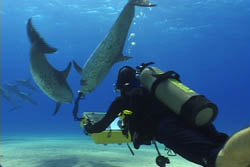Japan Vows to Continue Factory Ship Whaling
by Hardy Jones
Australian Prime Minister Kevin Rudd has threatened international legal action after the new Japanese government declared its intent to continue whaling.
Two weeks ago Japanese officials said the government would not support industries that were loosing money and required substantial subsidies to continue operations. That would have included the whaling industry and the withdrawal of subsidies would have forced a closure of Antarctic whaling operations based around the factory ship Nisshin Maru. Now Foreign Minister Katsuya Okada says there is no need to discontinue whaling.
The Japanese statement comes as the factory ship Nisshin Maru and its associated killer boats along with an escort of security ships, begins whaling in Australian Antarctic Territory waters.
Australia has traditionally been among those who have taken the strongest stand against whaling.
''Let me be very clear,'' Mr. Rudd said. ''If we cannot resolve this matter (whaling in the Antarctic) diplomatically, we will take international legal action.''
The International Tribunal on the Law of the Sea could impose an injunction to halt whaling 14 days after a case is lodged.
Other factors may force the end of factory ship whaling. The Nisshin Maru contravenes new rules proposed by the United Nations International Maritime Organization for ships operating in the Antarctic in at least three ways: The heavy fuel oil it uses would be banned; its hull-strength and safety would fail new requirements; and its annual
dumping of thousands of tons of offal at sea is rejected in the global nature reserve.
The regulations were backed by the Antarctic Treaty System after a series of accidents involving cruise ships. The Nisshin Maru itself has caught fire at least twice, on one occasion in Antarctic waters. The potential posed by this out of date factory ship for an environmental catastrophe in one of the world’s most environmentally sensitive areas is obvious.
One factor holding Japan’s feet to the fire should all the above-mentioned regulations be enforced is that Japan desperately wants a permanent seat on the UN Security Council. Violating UN regulations would hardly be helpful in achieving that goal.
It may well be that Japan will not want to appear to be knuckling under pressure from environmental groups but would silently be grateful for UN regulations that would force the end of its unprofitable and highly objectionable whaling practices.
Talks have continued over recent years at the International Whaling Commission in hopes of finding common ground between whaling nations and those nations that oppose it.
But there can be no compromise between those who kill whales and those who consider them sentient, intelligent beings. You cannot say “a little murder is OK.”
BlueVoice has published a white paper entitled “A Shared Fate” detailing levels of contamination in people who eat whale and dolphin meat. Mercury poisoning is a well-known threat but there is also evidence from Japanese scientists that diseases such as brucellosis are developing in whales. These are diseases that could spread to humans.
Subscribe to:
Post Comments (Atom)


No comments:
Post a Comment